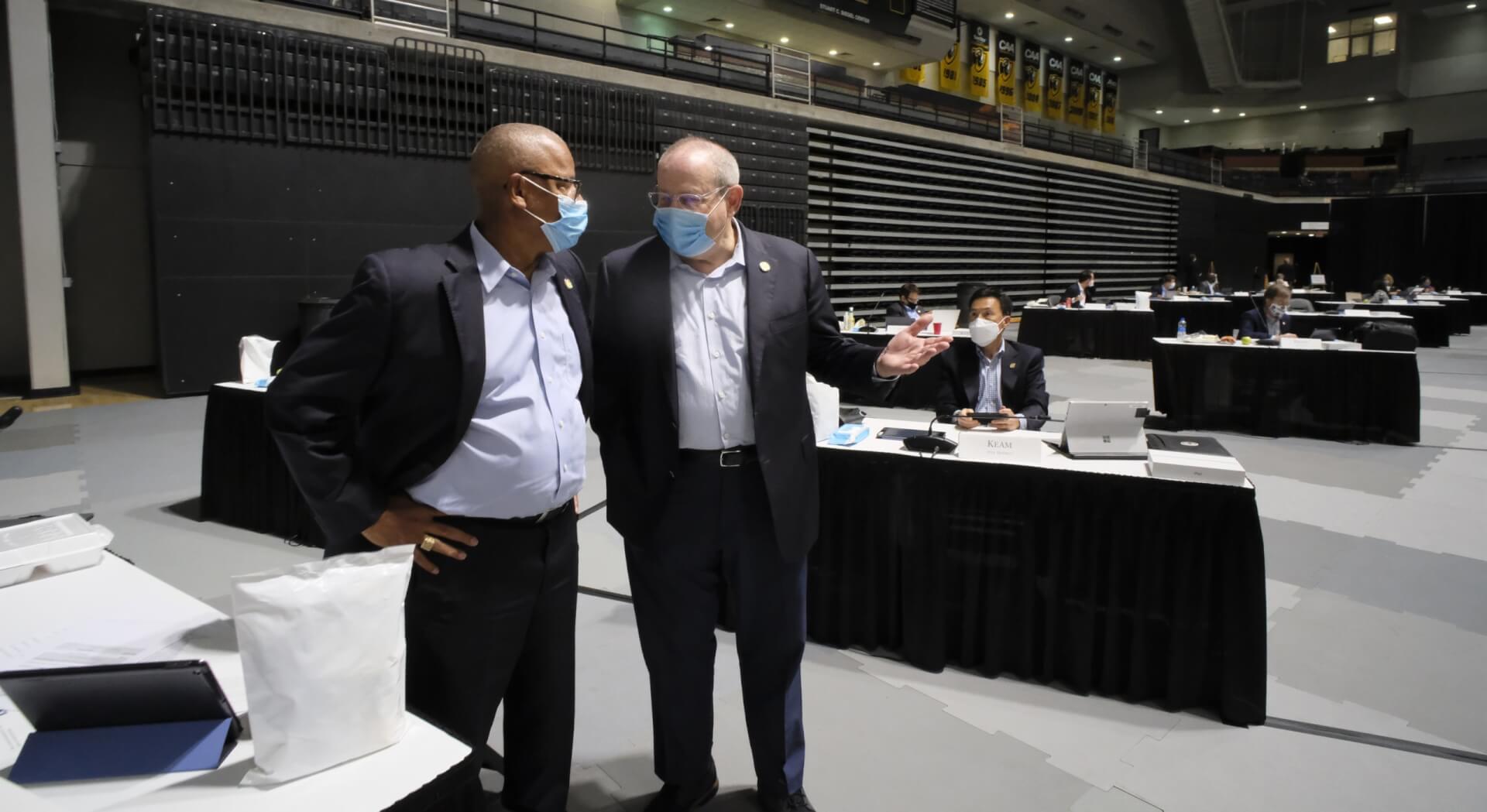Del. Luke Torian, D-Prince William, left, chairman of the House Appropriations committee, confers with Del. Mark Sickles, D-Fairfax, right, as the Virginia House of Delegates begins their special session inside the Siegel Center in Richmond, VA Tuesday, August 18, 2020. (Pool photo by Bob Brown/ Richmond Times-Dispatch)
How Virginia spends its remaining federal CARES Act funding was a point of contention between Gov. Ralph Northam and General Assembly lawmakers throughout an extensive special session focused on criminal justice reform and amending the state’s two-year budget.
It’s one that wasn’t resolved by Monday afternoon, when the Democrat-controlled House of Delegates rejected a series of proposed amendments made by Northam to the new spending plan passed by both chambers late last month.
The General Assembly’s final version of the budget took a more prescriptive approach to a little more than $1 billion in unallocated CARES Act funding, dedicating the remaining money to specific line items such as a statewide program for personal protective equipment and supplemental payments for childcare providers during the ongoing COVID-19 pandemic.
Northam had previously asked for more authority in spending the funds, giving him the ability to “respond to the needs of the moment in a flexible manner,” he wrote in an October letter to General Assembly leaders. When lawmakers declined, he responded with a proposed amendment to CARES Act spending, modifying the General Assembly’s budget to be more consistent with allocations he had “already approved or executed,” according to another message sent to the House last week.
“The language was to give us the flexibility to execute what they wanted us to do,” state Finance Secretary Aubrey Layne said in a phone interview Monday, adding that the administration had worked with the General Assembly’s finance committees to prioritize the remaining funding.
But House lawmakers effectively killed the governor’s amendment when they reconvened Monday afternoon to vote on his suggested changes to the budget. In a voice vote, the majority of delegates voted to “pass by” the amendment in their final action of the session — rejecting it for good unless the governor vetoes the decision.
“We like our language and we think it’s our role as the legislative branch to direct these funds,” said Del. Mark Sickles, D-Fairfax, a senior member of the House Appropriations Committee, before the vote. Much of the resistance can also be traced to longstanding frustration over how the Northam administration has allocated federal dollars for much of the pandemic.
“When we came in on Aug. 18, we had $1.3 billion that was still unallocated,” Sickles added in a later phone interview. “And they were promising to spend it all, but also telling Virginians who really needed the funds that they wanted to wait for the next federal bill to take the strings off the funding.”
Without an additional federal stimulus bill — an effort that’s been stalled in Congress for months — CARES Act funding can’t be used to cover revenue losses. States are required to allocate the money by Dec. 30 or return any remaining funds to the federal government.
Virginia’s leaders, like those in many other states, spent months hoping that a subsequent aid package would remove some of those requirements. But Sickles said the hesitancy to allocate federal funding in Virginia led to long delays in delivering much-needed assistance in areas such as K-12 education and hazard pay for home health workers.
In other cases, lawmakers and advocates have said the cautious approach to funding hurt relief efforts. A common example was the governor’s rent and mortgage relief program, which initially struggled to spend the $50 million in CARES Act funding it received at the end of June.
“Several Virginia entities that do the hardest work to keep our elderly and our most disabled population alive and healthy were not getting the assistance they needed,” Sickles said before the vote.

Secretary of Finance Aubrey Layne. (Ned Oliver/Virginia Mercury
(VM) – Layne, though, said the governor’s proposed amendment was largely based on how the administration felt it could reasonably spend remaining federal dollars before the Dec. 30 deadline. For example, he said the General Assembly appropriated $10 million in additional funding for cleaning, protective equipment, drop boxes and other costs related to the November election — money he said the state’s Department of Elections wasn’t able to use but that technically the administration would still be required to spend.
“All we’re saying is, ‘Gosh, guys, you gotta give us some flexibility,” he added. “This makes it a difficult decision, because we’re trying to make sure we don’t have to give any of these monies back.”
For Sickles, the House decision was based more on a fundamental disagreement over language the governor wanted to strike from the General Assembly’s budget.
Both the Northam administration and House negotiators said there was general consensus over what the remaining funding should be spent on and how much should be allocated to each item.
But Northam’s proposed amendment largely eliminated language that gave the General Assembly more authority over how the money was allocated — including specific instructions for how the state’s Department of Medical Assistance, which administers Virginia’s Medicaid program, should calculate supplemental payments to programs that offer day services for residents with developmental disabilities.
“One of the things that was deleted in the language was instructions to put into our budget any further federal relief funds that come down the pike from Congress,” Sickles said before the vote. “And to tell us before the session where the administration thinks that money ought to go.”
It’s still unclear whether Northam plans to challenge the House decision. His spokeswoman, Alena Yarmosky, said in a statement Monday that “Governor Northam looks forward to carefully reviewing the General Assembly’s action on the budget.”



